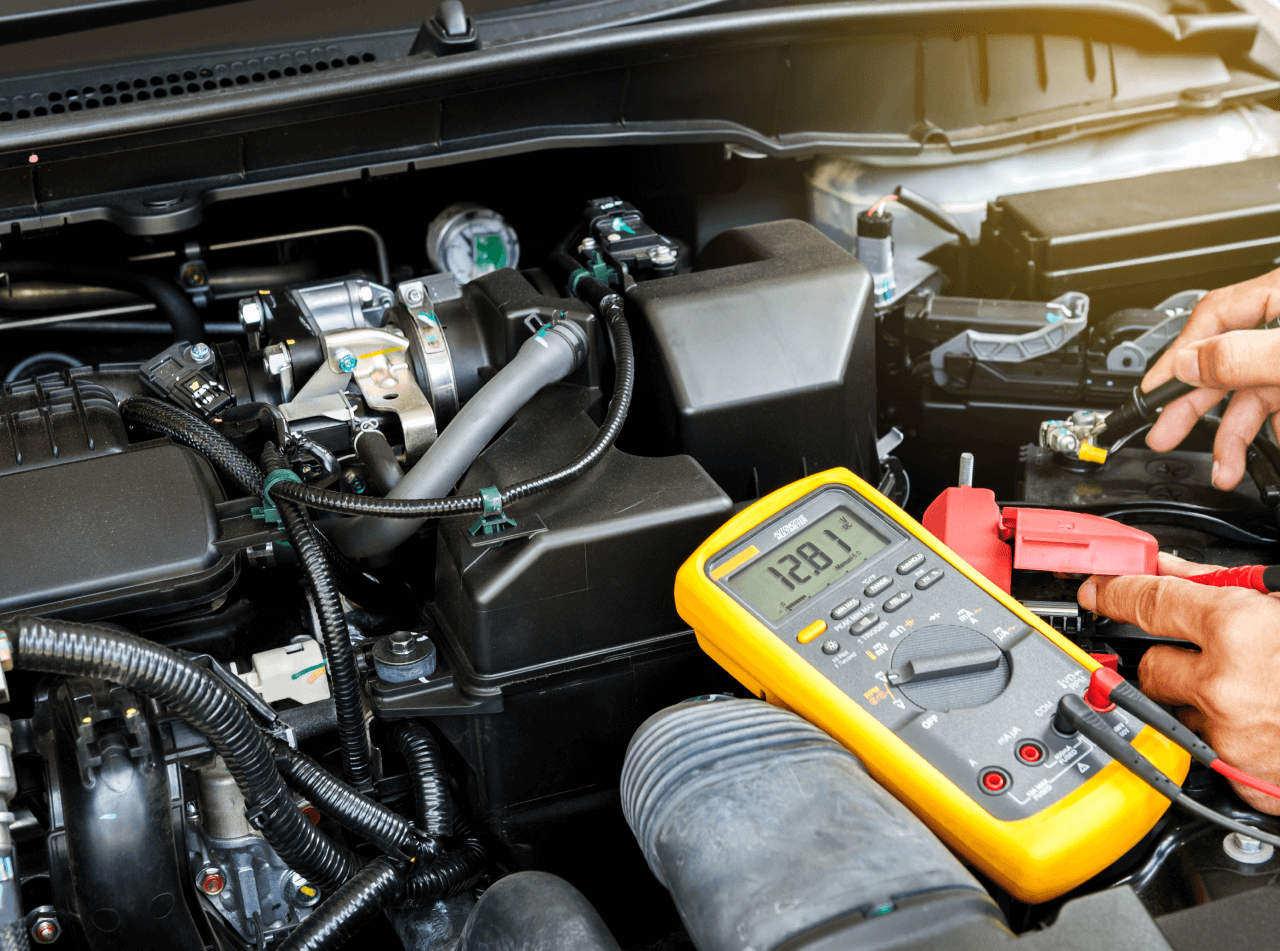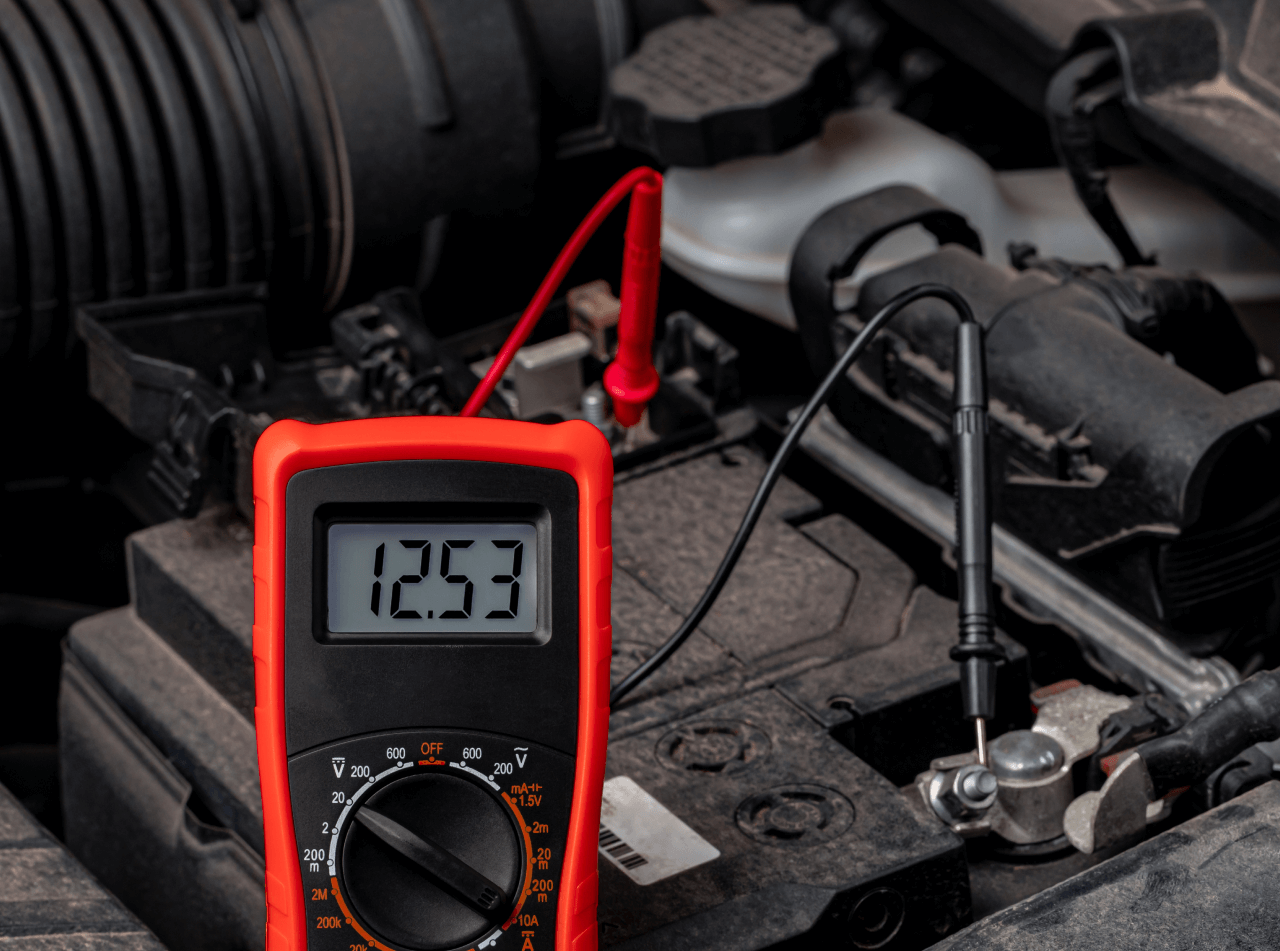
Car batteries are at the heart of every vehicle’s electrical system, providing the power needed to start the engine, illuminate the headlights, and keep the accessories running smoothly. But what exactly is car battery voltage, and how does it affect a car’s performance?
Whether you’re dealing with a dead battery or simply curious about maintenance, understanding how car battery voltage works can save you time, money, and frustration.
How Many Volts Is a Car Battery?
The standard car battery voltage is 12.6 volts when fully charged and at rest. This is typical for most modern vehicles, which rely on a 12-volt electrical system. When your car is running, the alternator recharges the battery and powers your car’s electronics, increasing the voltage to about 13.7 to 14.7 volts.
Standard Car Batteries vs. EV Batteries
If you’re used to a traditional car, you’re familiar with the standard 12-volt battery that keeps things running. But electric vehicles (EVs) take things up a notch with lithium-ion batteries that run at a much higher voltage—anywhere from 300 to 400 volts.
Here’s a quick breakdown:
- Voltage & Power: Traditional car batteries mainly start the engine and power accessories. On the other hand, EV batteries are the heart of the vehicle, powering the entire thing and allowing long-range driving.
- Battery Type: Regular cars use lead-acid, heavier, less efficient batteries. EVs use lithium-ion batteries, which are lighter, more efficient, and designed to last much longer.
- Charging: Your regular car battery recharges automatically while you drive. With an EV, you need to plug it in for a few hours, depending on your charging setup.
- Lifespan & Cost: A standard car battery lasts about 3-5 years and costs much less to replace. EV batteries, however, can last 8-10 years but are much pricier, often ranging between $5,000 and $20,000.
- Environmental Impact: Both types of batteries can be recycled, but EV batteries are a bit more complex to recycle due to the advanced materials inside.
While both have their purpose, EV batteries are meant to literally power everything the car does, offering way more capacity and longevity than the simpler, smaller ones in traditional cars.
Why Is Car Battery Voltage Important?
Car battery voltage is a key indicator of your battery’s health. By measuring the voltage, you can determine if your battery is charged, needs a recharge, or is potentially failing.
Here’s a quick guide to interpreting your car battery voltage:
| Voltage Reading | Condition |
| 12.6 volts or higher | Your battery is fully charged and in good condition. (About 100% charge) |
| 12.06 to 12.5 volts | The battery is partially charged but still functional. (Between 50%-90% charge) |
| 11.31 to 11.9 volts | This indicates a low charge; the battery may need to be recharged soon. |
| 10.5 volts and below | A deeply discharged battery that may no longer hold a charge effectively. In most cases, a dead battery. |
Checking Your Car Battery Voltage
If you’re wondering how to check your car battery voltage, the good news is that all you need is a multimeter, which is an inexpensive tool that measures electrical values.
Then, just follow these simple steps:
- Turn Off the Engine: Make sure your car is completely off to get an accurate reading.
- Set the Multimeter: Adjust it to the DC voltage setting.
- Connect the Probes: Place the red probe on the positive terminal (+) and the black probe on the negative terminal (-).
- Read the Voltage: The display will show your car battery voltage.
Regularly checking your car battery voltage can help you spot potential problems before they leave you stranded.
What Affects Car Battery Voltage?
Several factors can influence your car battery voltage, including:
- Temperature: Extreme heat or cold can cause voltage fluctuations. Cold weather, in particular, can reduce a battery’s ability to hold a charge.
- Usage: Frequent short trips prevent the alternator from fully charging the battery, leading to lower voltage over time.
- Age: As batteries age, their capacity and voltage output naturally decrease.
When to Replace Your Car Battery
If you find yourself frequently asking, “How many volts is a car battery supposed to have?” because your readings are consistently low, it might be time to replace your battery.
Most car batteries last about 3-5 years, depending on usage and environmental factors.
Signs that your battery might need replacing include:
- Slow engine crank when starting your car.
- Dim headlights or flickering dashboard lights.
- A warning light on your dashboard, often shaped like a battery.
Tips for Maintaining Optimal Car Battery Voltage
- Drive Regularly: Long drives allow the alternator to recharge the battery fully.
- Clean Battery Terminals: Corrosion can interrupt the connection and reduce voltage.
- Avoid Draining the Battery: Don’t leave lights or electronics on when the engine is off.
- Test Your Battery: Check the voltage every few months to stay ahead of potential issues.
And if you’re ever in doubt or just want a professional opinion, we’ve got you covered.
Whether you drive a gas-powered car, hybrid, or EV, from check-ups to hybrid and EV repairs, our experts at Master AutoTech will keep your vehicle running at its best.
Book your appointment now, and let us take care of the rest!
Related Posts
Key Takeaways On average, passenger vehicle tires last 40,000 to 60,000 miles, depending on type, driving habits, and maintenance. Replace tires when tread depth reaches 2/32”, if damaged, or older than 10 years. Regular rotation, alignment, and proper inflation extend tire life. Aggressive driving, poor roads, and harsh weather shorten tire lifespan. Take advantage [...]
When you think about car maintenance, you probably focus on oil changes, tire rotations, and maybe even brake pad replacement. But what about your brake fluid? If you’ve ever wondered, “What does brake fluid do?” or “Why is brake fluid important?”, you’re not alone. Brake fluid might not be the most talked-about part of [...]
Is that high-pitched squeal from your brakes driving you—and everyone else—crazy? Don’t ignore it. Squeaky brakes aren’t just annoying, they’re your car’s way of saying something needs attention. Whether you're cruising through Salt Lake City or winding up Idaho’s mountain passes, here’s what’s likely going on, how you can fix it, and when it [...]







